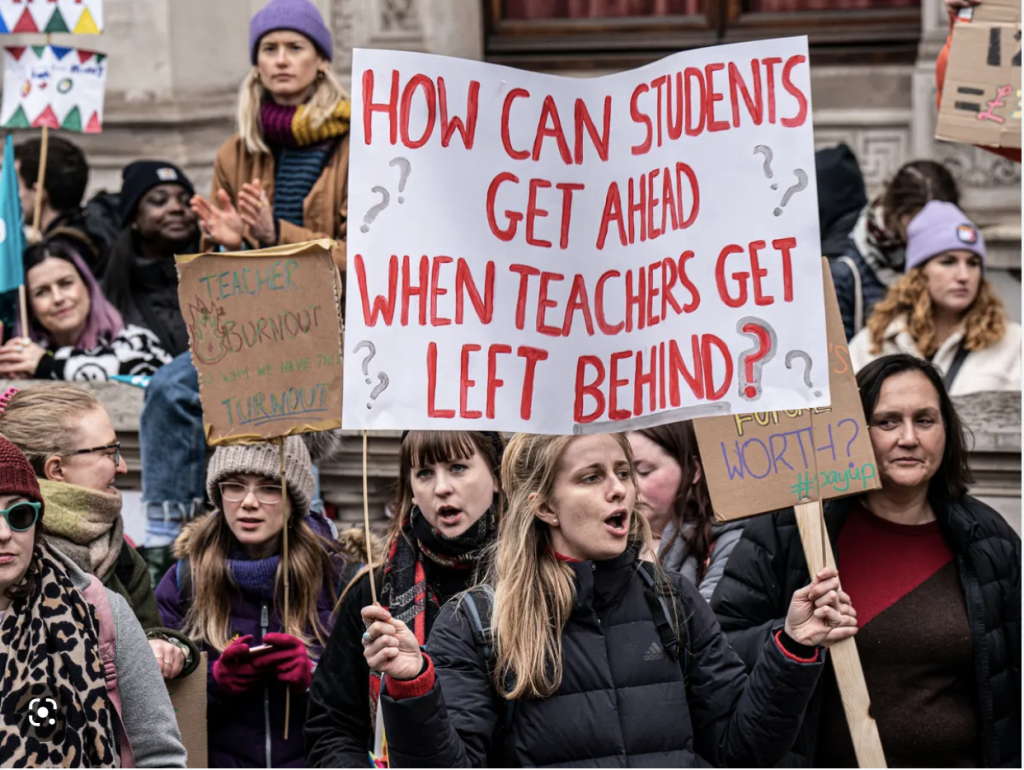by Oscar Rickett
This article particularly resonated with the current events and general strikes in the UK.
The article illustrates perfectly something that tutors around the country noticed at the University but also echoes the fast changes I have lived through my studies in the UK.
As an international student who came to London to study, attracted by the reputation of the University and the outstanding notoriety of UK education, I fell for this image and dream of being in the centre of the most exciting and visionary university.
I quickly discovered that this notoriety was a product marketed and packaged under the golden letter of a famous university taping in our collective imagination and with the face of famous alumni.
Across 4 years, I have seen this dream slowly reveal the corporate backbone through the university fees reform and through a general feeling that good times were over.
The ever more grandiose plans of making this university the image of success and luxury were far more important than the actual quality of teaching.
We often felt ungrateful to even feel the need to complain about the teaching quality, being reminded that we were part of this exclusive and elitist club of future star designers.
The buildings became more and more luxurious, bigger and high-tech without a reflection on the teaching methods, generating frustration in many international students who were paying the high fees with a general concern about our future employability.
“My students are lovely and very bright but they’re very fearful of failure and they’re wanting us to give them a template of what to do in the future,” Andrew Warnes, a professor in the English department at Leeds University,
Years after, and on the other side, I see a relationship based on a clientele approach to teaching, where failure is not an option either for the students or tutors.
The learning is quantified by success rate more than actually on the learning outcome or visions.
It feels like we deliver a recipe for employability kits which is no longer based on the reality of society or even based on the idea that University is a place to think, question and test but also fail.
With international fees skyrocketing, there is a feeling of buying the golden tickets which false expectations, of I, want to know now and not how.
“Are they institutions that everybody feels they have a stake in, whether they are students or not? Are they entrepreneurial businesses, hunting out new streams of profit? Are they training centres for employable skills? Are they places that train thinking, particularly the critical thinking required if we are to live in a healthy democracy? Do they introduce students, and so the wider culture, to resources of history and art and literature that could make them feel more alive… And if some of these descriptions have come to seem expendable, or luxuries, affordable only by the wealthy few, then I think that’s a serious problem for all of us.”
The question is what world we want and how much we value democracy, creativity or even our future.
If academics are seen as disposable and knowledge, creativity or innovation is no longer the priority and education a luxury are we not destroying the most lucrative UK product: its creatives?
What would be the UK TV and film industry, music, design, theatre, fashion etc.. which are exported everywhere in the world without creative teaching, without the diversity of perspective, diversity of heritage and backgrounds or diversity of academics asking students to think, to test, to share, to fail, to reflect, and to dream and create a unique vision of the world.
Do we still want to make a fair future for all or just an illusion based on a corporate dream for those who can afford it?
“My students have a passion for the books and I still have fantastic discussions with them, so there is some optimism,” he said. “I’m waiting for common sense to prevail and for people to realise that treating a university like a business is not a good idea… I have a young family, I have to feel optimistic.”
